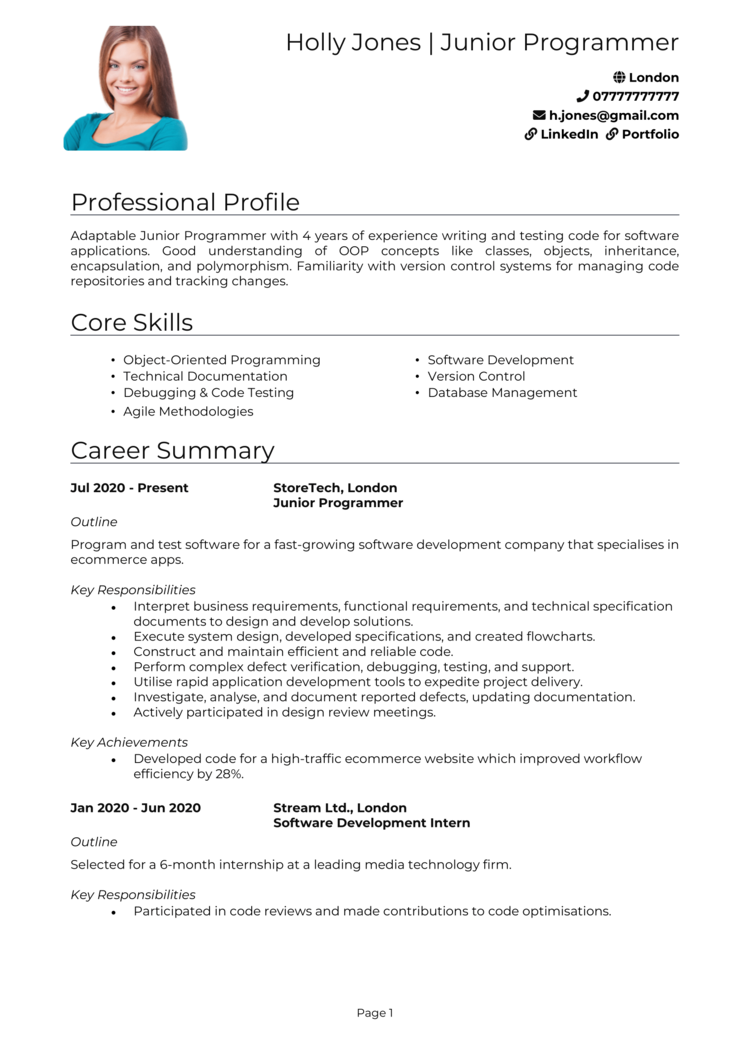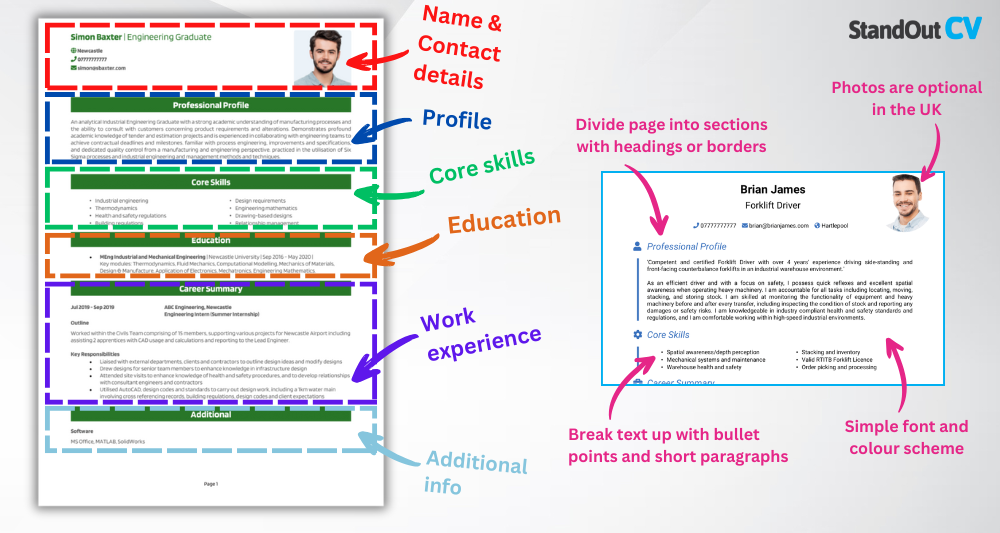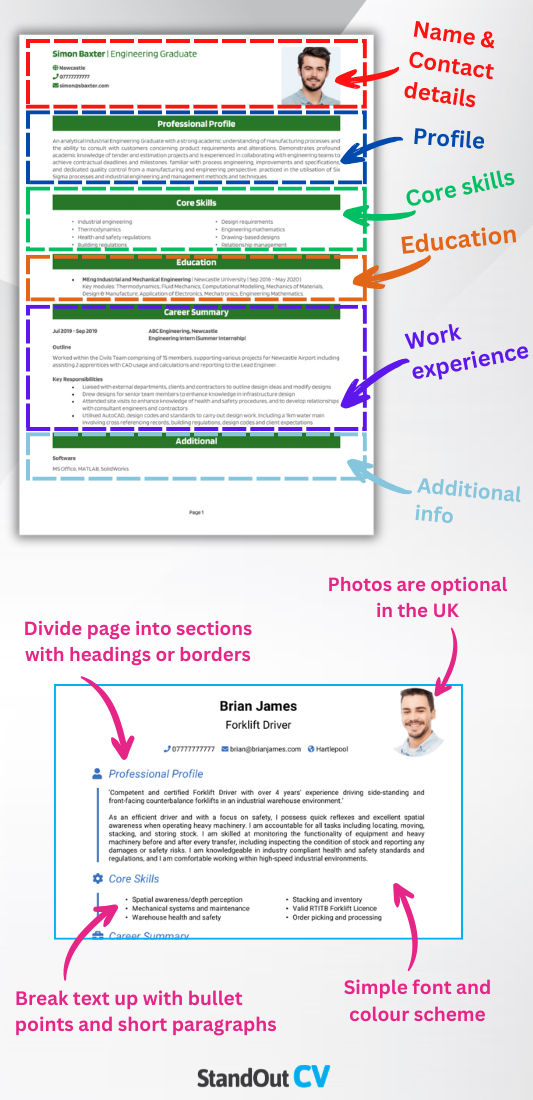Everyone starts somewhere – even the hiring manager reading your CV once had to write their first one. If you’re entering the job market for the first time, the lack of experience doesn’t mean you lack potential. It’s okay if your CV isn’t stacked with jobs – just don’t let it feel like a blank sheet of paper.
This guide, along with some Entry-Level CV examples, will help you craft a clear, confident application that shows employers exactly why you’re worth investing in – even if your work history is still under development.
Entry Level CV sample

Entry Level Accountant CV

Entry Level HR CV example

Entry Level Project Manager CV

Entry Level Business Analyst CV

Entry Level Programmer CV

Entry Level Software Developer CV example

How to write your Entry Level CV
Discover how to create a quality Entry Level CV with this simple step-by-step guide.
When you don’t have much experience to show, your CV needs to work even harder to prove you’re capable. It should highlight transferable skills, enthusiasm, and anything else that shows you’re ready to hit the ground running.
This guide will walk you through how to structure and shape your CV so it doesn’t feel empty – it feels focused. Whether you’ve just finished school, graduated from university, or are changing careers, we’ll help you showcase what you do bring to the table.
The best way to structure and format your Entry Level CV


If you’re applying for entry-level jobs, writing a CV which is clear and well-organised can instantly help you stand out. Employers know you may not have a long list of past roles, so what they want is clarity, structure, and signs that you’ve thought through your application, and a clear structure shows you’ve got your act together.
Here’s the layout to follow:
- Name and contact details – Keep personal details right at the top so employers can easily get in touch; no photo required.
- Profile – Start with a few lines that summarise your strengths, interests, and what kind of role you’re looking for.
- Core skills – Highlight transferable or soft skills like communication, organisation, or digital literacy.
- Work experience – Include any part-time jobs, volunteering, internships, or school projects that show responsibility and initiative.
- Education & certifications – Clearly list your qualifications like a degree and any short courses or training you’ve completed.
- Additional info – Optionally include interests, hobbies, or awards that reflect your personality or potential.
Stick to two pages in length maximum – with no experience, you should fit everything onto just one. Stick with a professional font and use bullet points to make things skimmable, with clear borders between your sections. The more polished your CV format looks, the more likely it is to survive the recruiter’s 8-second skim.
What is an Entry Level CV profile?


A good profile doesn’t need to be long – it just needs to make it clear why you’re ready to start your career. Use this short summary to highlight your most relevant strengths and your motivation. Skip the ‘I’m a hard worker’ clichés – everyone says that. Tell them why you actually are: your CV profile should focus on tangible skills that recruiters actually care about.
Entry Level CV profile examples
Profile 1
Motivated and adaptable professional with a strong academic background and hands-on experience through internships and part-time roles. Eager to contribute to team goals and develop skills in a fast-paced work environment. Known for being a quick learner with strong communication and organisational abilities. Proficient in Microsoft Office and collaborative tools.
Profile 2
Reliable and enthusiastic candidate seeking to begin a career in a professional environment. Skilled in customer service, basic administration, and time management through volunteer experience and retail work. Strong interpersonal skills and a willingness to take on new challenges. Eager to learn, contribute, and grow within a supportive team.
Things to have in your Entry Level CV profile
Here’s some tips on what to include:
- Education and background – State your current situation: are you a recent graduate, school leaver, or career changer?
- Core strengths – Include two or three soft or transferable skills that make you a strong entry-level candidate.
- Career interests – Briefly outline the type of job or industry you’re looking to start in.
- Attitude – Employers want someone who’s eager to learn – make that come across.
How to highlight your core skills


Your experience might be limited, but your CV skills section shows you’re far from starting from scratch. With limited experience, it becomes especially important. Focus on transferable strengths you’ve developed through school, part-time work, or life experience.
Examples might include time management, communication, teamwork, adaptability, or IT literacy. Be honest and specific – but make sure they’re relevant to the type of job you’re applying for.
Essential skills for an Entry Level CV
- Time Management – Organising tasks efficiently to meet deadlines and stay productive in a new role.
- Basic Computer Skills – Using essential software such as Microsoft Office, Google Workspace, or data entry tools.
- Team Collaboration – Working effectively with others to support team goals and contribute to group projects.
- Communication Skills – Clearly expressing ideas and following instructions through verbal and written communication.
- Customer Service – Providing assistance and support in client- or customer-facing roles with professionalism.
- Problem-Solving – Thinking critically to resolve basic challenges and find practical solutions.
- Adaptability and Willingness to Learn – Adjusting to new environments, tasks, and responsibilities quickly.
- Organisation and Attention to Detail – Keeping work organised and completing tasks accurately.
- Professionalism – Demonstrating reliability, punctuality, and a positive attitude in the workplace.
- Basic Administrative Tasks – Handling duties like filing, scheduling, or record keeping to support business operations.
Structuring your education section


For entry-level candidates, this section often carries the most weight – so give it pride of place. Clearly list your academic history in reverse chronological order, starting with the most recent qualification.
Include the name of the qualification, where you studied, and when. If you’re still studying, note your expected completion date. You can also mention relevant subjects, coursework, or modules if they relate to the job.
Example education sections
Education 1
Upper Second Class BA (Hons) English Literature | University of Birmingham | 2020–2023
Modules included Modern Fiction, Professional Writing, and Literary Theory. Completed a final-year dissertation on the role of narrative structure in postmodern literature. Gained experience in academic research, presentation skills, and critical analysis through seminar work and group projects.
3x A-Levels (A-B) | St. Helen’s Sixth Form College | 2018–2020
9x GCSEs (A*-C) | Norwood High School | 2016–2018
Education 2
Distinction BTEC Level 3 National Diploma in Business | Southgate College | 2019–2021
Completed coursework in Marketing, Business Finance, and Event Planning. Took part in a simulated enterprise project, developing a business plan and presenting it to a panel. Demonstrated skills in teamwork, communication, and deadline management.
9x GCSEs (9–4) | Westwood Community School | 2017–2019
What to include in your education section
For each qualification, add the following info:
- Qualification & organisation – State the name of the certification and where you attained it.
- Dates studied – Provide the start month and year, and the finish (or state that it’s ongoing).
- Extra details – For particularly pertinent modules or courses, you should expand to tell the recruiters how they have equipped you for the roles you’re applying for.
Top qualifications to showcase on an Entry Level CV
- GCSEs or equivalent – The baseline qualification most entry-level jobs will ask for.
A-Levels, BTECs, or T-Levels – Helpful if you’ve pursued further education post-GCSE.
Apprenticeship Training (in progress or completed) – Especially valuable if you’ve started learning a trade or skill.
Functional Skills or NVQs – Shows you’ve developed practical, job-ready skills.
Short online courses or CPD (e.g. digital skills, admin, customer service) – Demonstrates initiative and personal development.
How to showcase your work experience in your CV


You don’t need a fancy job title to show you’ve learned something valuable – use this section to prove you’ve stepped up. Employers want to see examples of responsibility, effort, and contribution – whether it was paid, voluntary, or part of your education. Even short-term roles or volunteer work can show commitment, responsibility, and maturity.
Start with your most recent work experience, and include things like part-time work, retail shifts, hospitality, internships, volunteering, or group projects. Describe what you did, how you worked with others, and what you learned.
How to format previous jobs in your CV correctly

- Outline – Mention where you worked (or volunteered), your role, and when.
- Responsibilities – Briefly describe your main tasks and responsibilities. Use action words like “assisted,” “organised,” or “contributed.”
- Achievements – Include any outcomes – did you receive positive feedback? Did you help your team succeed? Did you learn something valuable?
Example work history for Entry Level candidates
Admin Assistant (Placement) | Bridgemore Legal Consultants
Outline
Provided general administrative support for a small legal consultancy, gaining exposure to document handling and client communications.
Responsibilities
- Filed legal correspondence, scanned documents, and maintained digital archives.
- Assisted with diary management and scheduled appointments for senior staff.
- Welcomed clients and handled front-desk queries in a professional manner.
- Updated spreadsheets and tracked case progress for internal use.
- Prepared meeting rooms and supported events with catering and setup.
Achievements
- Helped improve file organisation, reducing document retrieval time by 30 percent.
- Received positive feedback for professional phone handling and client interaction.
- Completed all assigned admin tasks consistently ahead of deadlines.
Retail Assistant | The Oakridge Bookshop
Outline
Worked part-time for an independent retail bookshop, supporting customer service and day-to-day operations.
Responsibilities
- Greeted customers, answered product enquiries, and processed sales at the till.
- Organised displays and shelves to enhance the in-store shopping experience.
- Monitored stock levels and restocked products when needed.
- Handled customer complaints and resolved minor issues independently.
- Supported seasonal promotions and book signings by helping with event logistics.
Achievements
- Improved customer satisfaction by delivering friendly, helpful service during peak hours.
- Praised by supervisors for reliability and positive attitude.
- Helped boost weekend sales by suggesting upsell items at checkout.
Structuring your additional info section


Junior candidates can make good use of the optional additional info section, especially as you’ve likely got space left over from the more important parts.
If you do anything in your spare time which could be relevant to the role you’re applying for, you should mention them here, and explain why each equips you for your target jobs.
Good additional info for Entry Level candidates
- Hobbies – Include activities that reflect key workplace skills like communication, reliability, problem-solving, or creativity. Sports, creative projects, or organising group activities can all be relevant.
- Awards and Achievements – Any school, college, or community recognitions show motivation, dedication, and potential—especially useful when you don’t yet have much formal work experience.
- Extracurricular Activities – Being part of student groups, clubs, or informal team projects can demonstrate leadership, collaboration, and initiative.
- Personal Projects – Side projects like learning a new skill, managing a social media page, or starting a blog can help show enthusiasm and a proactive mindset.
Additional info example
Additional info
Hobbies
Creative writing – Writing short stories and blog posts to improve written communication and storytelling abilities.
Playing football – Developed strong teamwork, leadership, and perseverance through regular matches and training.
Learning video editing – Taught myself how to edit using free software, gaining technical and problem-solving skills.
Awards and Achievements
School prefect – Selected for leadership and trusted to support younger students and assist with school events.
Certificate of Achievement – Awarded for consistent academic performance and positive attitude.
Extracurricular Activities
Debate club – Improved confidence and communication through regular public speaking and argument structuring.
Music band member – Played guitar in a school group, building collaboration skills and time management through practice and performances.
Personal Projects
YouTube channel – Created and edited weekly content around tech and lifestyle, growing communication and digital media skills.
Budget tracker – Designed a basic Excel tool to manage personal finances, learning key spreadsheet functions.





